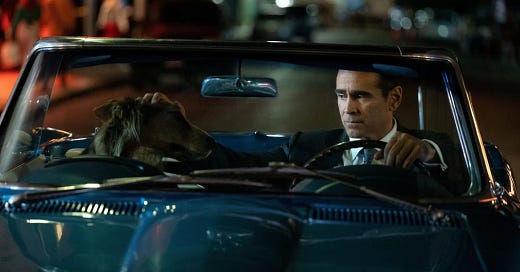‘Sugar’ – something odd about this defective detective
From the outset, there’s something odd about this private eye and his encounter with Los Angeles. We meet him first in Tokyo, speaking Japanese and solving a case with a combination of violence and his disdain for its use. Then, he’s elsewhere in the world, briefly, shown speaking Arabic, French and presumably other languages.
There’s something odd about the case, too. John Sugar (played by Colin Farrell), arrives by plane in LA. He makes his way to a house where a young woman, Ruby (Kirby Howell-Baptiste), with a nose-ring and a stack of tightly braided hair – a lover, we wonder, a friend? – greets him and hears of his plan to search for the missing granddaughter of a movie mogul. She is calm but clearly not pleased. From her garage, he extracts his blue, early 1960s Corvette Stingray convertible and drives off to meet the famed producer, Jonathan Siegel (James Cromwell), at his mansion.
And there’s something odd about the telling of the story. Echoing films noirs of the 1930s, ’40s and ’50s, Sugar narrates the action, revealing his encyclopedic knowledge of Hollywood’s greatest. Dressed – almost always – in a crisp black suit, bright white shirt with cufflinks, and a tie, a nod to other movies of the past, he tells us of his puzzlement but little of his back story, only a reason why he so wants to pursue this assignment, against Ruby’s advice. Someone called “Jen” (or “Djen” if you watch with subtitles, another little oddity), who is clearly dear to him, is also missing.
The cinematographic devices bring echoes of old movies too – quick cut-aways to shots, many in black-and-white, from 1950s narrow-screen versions of Glenn Ford, Fred MacMurray, Humphrey Bogart, Peter Lorre and others – interspliced with contemporary action. There’s something big, unknown, in the background that makes this case feel like “LA Confidential,” that 1997 movie that deliberately recalls – in setting, dialogue, music and atmosphere – the 1930s, ’40s and ’50s, when LA was being made and everyone was on the make. It’s a movie that Sugar, as narrator, name-checks.
This eight-part series, called simply “Sugar,” feels like an attempt by the upstart Apple TV+ to break into the streaming big time with its big nod to the big studios of old that Apple would like to vanquish. “Sugar” might be the series that – alongside “Slow Horses” – finally establishes Apple as a big player, the way that the Kevin Spacey version of “House of Cards” did for Netflix. Or maybe not.
Because there’s something really odd about “Sugar.” It’s not the complex plot, or the sense that we viewers have of being lost. Detective stories always challenge our epistemology, not just what’s true but whether we can know what truth is. We are used to looking for fragments of it scattered among the rubble of a system of knowledge that has collapsed, where the good, the foolish, the honest and the evil lie around like litter. But it’s a detective story, so we trust that we will learn, eventually, how the pieces fit together. If we’re attentive enough, we may feel – if not quite know – how the puzzle comes together. We’re sure it will. That’s the way we – and Hollywood – tell such stories.
There’s something odd about everything. In our household, we started saying that in the opening scenes and kept saying it all the way through. Much of the story follows the conventions of genre, all the anchor points you could wish for to establish the heuristics of detective fiction (Nordberg, 2021). The private investigator himself is a mystery. In his first-person narration, he won’t talk about his life, even when he’s talking only to himself, and us. When the subject comes up in dialogue, he dodges. So far, so ordinary.
But when the surprise comes, it comes from a place far distant from the conventions of this genre. Not within a million miles. I won’t spoil the surprise – the fun and disappointment, the thrill of discovery and the sense of having been cheated – that come with the reveal. Or the sense that you missed the biggest clue of all, that you’ve been outsmarted. For this is a series that turns the epistemological puzzle of detective fiction into an ontological upset. I don’t know, even now, the day after watching its conclusion, whether to feel that my attention to the series has left me enlightened or deceived.
But “Sugar” succeeded in one important test of any story: It is likely to stick around in my head the way that “LA Confidential” and a few other great Hollywood movies do. But I won’t mention which ones. Doing so might spoil your fun, or maybe your revulsion. Or both. We don’t like spoilers.
Nordberg, D. (2021). Category Choice in Creative Writing. New Writing: The International Journal for the Practice and Theory of Creative Writing, 18(3), 330-345. doi:https://doi.org/10.1080/14790726.2020.1855200. See also https://eprints.bournemouth.ac.uk/34858/1/Nordberg%20CategoryChoiceInCreativeWriting%202020%20accepted.pdf




